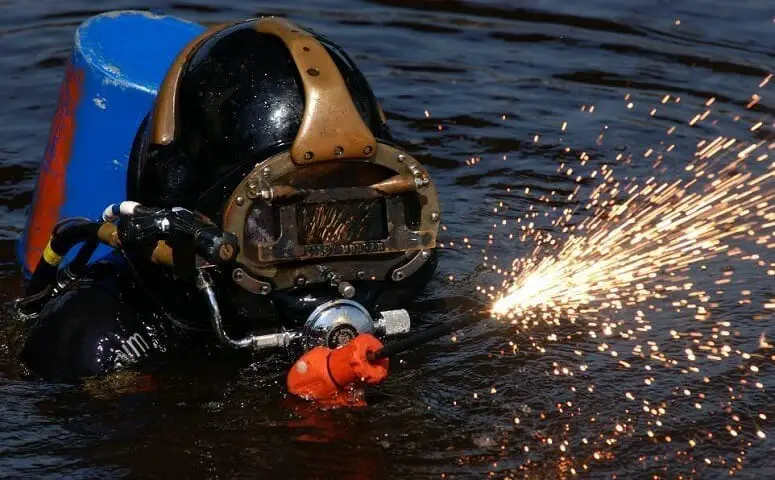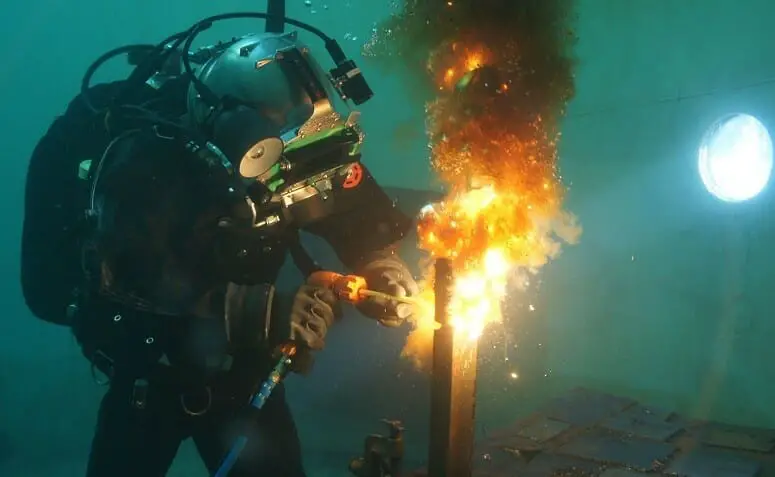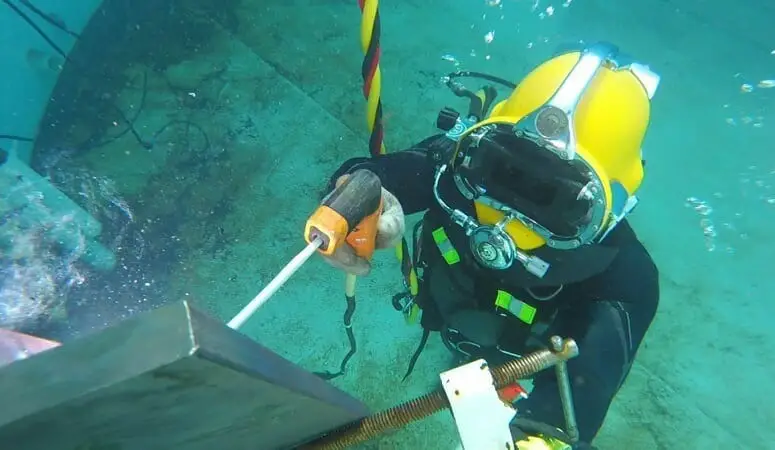Underwater Welding is considered a highly-specialized field. This commercial diving field can be very sort after. It can be very lucrative as a commercial diver and career opportunities are usually unlimited.
Underwater welders work in construction, surveying, and repair in both fresh- and saltwater.
While the rigors of the job can be quite demanding and the risks can be many, underwater welding can be a very rewarding career. Let’s look at some of the risks that contribute to the payoff for commercial diving.
Risks From Being a Commercial diver
Among the biggest risks for underwater welding are those come from commercial diving. The nature of diving exposes a welder to hypothermia, drowning and decompression sickness aka “the bends”.

Our intention isn’t to sound gloomy, but of course it’s important to be aware of the risks. Below are the risks of being a commercial diver, but read on to find exactly why they're so dangerous, how they happen, and the implications:
- decompression sickness
- hypothermia
- drowning
- eletrocution
1. The Bends / Decompression sickness
Decompression sickness occurs when a diver ascends from deep water too fast. This process has to be done gradually. It’s a result of the change of pressure on the body.
The nitrogen with their air supply in with the diver’s tank can actually bubble as the pressure releases too quickly. It can enter the diver’s bloodstream and cause memory loss, loss of judgment and reasoning and in extreme cases even paralysis or death.
2. Hypothermia
Another potential problem is hypothermia. The temperature underwater is always colder than above the surface. The diver’s body experiences much colder temperatures in large bodies of water, whether that’s inland or offshore.
The cold water conducts heat away from the body. That loss of heat can cause metabolism problems or even organ failure if the body remains too cold for too long.
Wearing a well-insulated rubber wetsuit can help protect the body from exposure to extreme temperatures.
3. Drowning
Even the best divers have to be aware of the risk of drowning. It can happen even when a diver has an air tank attached and waterproof equipment.
Older or ill-maintained equipment is one cause. Another is when the diver gets tangle in underwater obstacles. The deeper you get, the harder it is to see. At times, underwater welders may even get tangled in the lines of their own equipment.
Before making a dive, especially for wet welding, you should always check your equipment to make sure nothing is broken or left unsealed. Be sure you have a full air supply tank.
If you get in a situation where you are entangled, drop you diving weights to gains some buoyancy that can help pull you up and out of the situation.
Is Underwater Welding Worth It?
Yes, Underwater welding is a very profitable job choice. However it does have it's risks, just like any other skilled job. It's important to weigh up the advantages and disadvantages before you fall in love with this career choice, just in case it's too risky for your current lifestyle.
The 3 main reasons you would avoid a commercial diving career or wet welding job would be:
1. Cost of Training
The cost of training is not cheap and this may put many newbie welders off. Make sure you contact your commercial diving school to see what their certifications cover and what your tuition fees will cover.
2. Job Flexibility
Many welder-divers are not used to the commercial aspect of welding underwater and may prefer the more offshore option. This usually means higher pay, but can be complicated if you have other commitments, like family interests.
3. Age & Skill
Many people believe that the younger the better for this type of profession, but that's simply not the case. Although you may find a majority of underwater-welders below 30, it shouldn't stop more seasoned welders getting involved.
Underwater Welding Death Rate
Surprisingly there are very little death rates that are directly attributed to welding underwater. Contrary to popular belief water and electricity don't cause many deaths. In fact, there has only been 1 recorded case of a welder who died because of a direct link between welding and being underwater.
This incident occurred in 1943 in at the Deep Sea Diving School. As you can see this was a very long time ago and safety and equipment have continued to improve. This makes welding jobs underwater a lot safer then most people think and even safer than every day more common jobs.
Welding in general has safety issues, but the underwater welding death rate is very low. It should be mentioned that some deaths happen to welders underwater that aren't directly related to welding. These are not included in the official figures.
commercial diver Risks from the Environment
Underwater wet welding is done either inland in lakes, rivers, and ponds or in the ocean. Both environments bring with them their own set of risks for the welder.

Inland work is generally in freshwater. Freshwater welders operate in shallower waters than saltwater welders. Freshwater carries greater water currents at shallower depths. This demands more of the diver’s energy to stay in place. It can also cause your welding arc to stray.
Saltwater or Ocean welders operating in deep water must offset the buoyancy of saltwater. That means the diver has to carry more weight - sometimes nearly equal to his own weight. That increases the pressure on the body.
In both environments, divers are operating dangerous equipment in a dark place. You might carry auxiliary lighting, but other than that your welding arc is it.
Underneath the water’s surface, there are any number of obstacles such as plant life, rocks or reefs as well as the object being welded. Such obstacles can be difficult to see in dark waters, making it easy for a diver’s air hoses to become entangled.
Risks from Electrocution and Explosion
Underwater wet welding operators are working with electricity and flame from heavy welding equipment. This creates the risk of burns and electric shock. Electrocution often happens as a result of equipment problems.
In Freshwater, the welding arc often behaves in an erratic and unstable manner and doesn’t connect securely with the metal being welded. If the diver is not experienced in dealing with the arc and firmly securing the weld, the risk of electric shock to the diver is great.
Those working in deeper water face more risks than those that work in shallower depths. The risk of explosions can be greater in offshore underwater wet welding positions due to the amount of fuel stored on offshore oil rigs and marine vessels.

Also, pressurized gases in a dry chamber weld site can create erratic arc behavior, increasing the risk of electric shock or explosion.
Specialized Training
Underwater welders must receive specialized training to operate in these difficult. This trainer teaches you to adhere to safety protocols for your own protection.
Many studies have proven that divers who are physically fit are better suited to withstand the health risks of underwater welding. Staying in shape, hydrating well and avoiding alcohol are great ways to stay physically fit.
Many companies require “Fit for duty” certification or evidence of good health. Generally this is done before you can be hired and throughout employment. It’s a great way for both you and them to make sure you’re up to the physical tasks of the job.
Most companies that hire commercial welders stress safety protocols. They also require a certain number of hours of safety training. Underwater welders never dive alone.
Diver tenders help ensure that diving and welding equipment is ready before any underwater welding operation is undertaken.
Alternating divers so that no one diver has to stay under for very long is one great preventative measure. Another is the use of decompression chambers to help avoid the bends.
Wearing insulated diving gear and limiting the time underwater can help stave off hyperthermia. Utilizing diving lights and following safety procedures should help avoid obstacles that can entrap a diver.
Companies that engage in underwater welding operations are increasingly using more modern methods that enclose the area to be welded. In freshwater, a pit or a pen (known a cofferdam), can be fixed to the work structure with sealed clamps.
The water is pumped out to create a dry area for the welder to work in. In deep water, a full or partial hyperbaric welding chamber also has the water removed. These have life-support systems and provide a dry environment for the welder to operate.
Is It All Worth It?
Underwater welders handle big equipment designed for underwater welding in an uncertain, often hazardous environment. It is not any surprise that this type of work involves a significant amount of risk.

This type of welding commands higher salaries for welders since it requires such specialized training and skillsets and involves many risks. Typically skilled water welders are paid by the project.
The amount they are paid is heavily influenced by the environment they will be diving in, the depth the project is located at, the diving method being used, and they type of welding required.
According to the American Welding Society, underwater welders can command salaries in the $100,000-$200,000 range.
What it Takes to be an Underwater Welder
FAQs
Can you die from underwater welding?
Yes, you can die from underwater welding. Common causes of death are drowning and electrocution. There are about 10-15 deaths per year for those in the field.
What is the death rate of underwater welding?
There about 10-15 deaths per year. With about 6,500 underwater welders that equates to about .015% to .022%
Is Underwater welding worth the money?
Being a welder underwater is generally worth it. The high pay is the most attractive part of the job, but it certainly has risks that need to be balanced and analyzed.
What is the lifespan of an underwater welder?
The lifespan of an average welder underwater is actually consistent with the average lifespan of anyone else. Although there are certainly risks, the low death roll of 15 per 10,000 underwater welders has low impact on average lifespan.
Is Underwater welding worth it?
Underwater welding is a good career with high compensation and good benefits. It has its dangers since there is risk of injury and death.
How many years can you be an water welder?
You can be a welder underwater as long as you are physically healthy, typically for about 35-40 years if you start after high school at age 18 and weld until about 55.
What qualifications do I need to become an underwater welder?
To be an welder underwater you need:
- Highschool GED
- Underwater Welding certification
- Commercial Diving certification
Conclusion
Underwater welding offers the opportunity for travel, adventure, and lucrative pay. Salaries in underwater welding can vary widely.
But it can be more lucrative than welding strictly on dry land due to the training involved, the environment they work in and the amount of risk involved.

